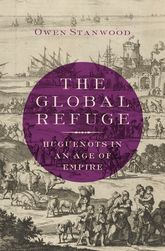07 October 2020
This book offers the first global history of the Huguenot diaspora, explaining how and why these refugees became such ubiquitous characters in the history of imperialism
This book offers the first global history of the Huguenot diaspora, explaining how and why these refugees became such ubiquitous characters in the history of imperialism. The story starts with dreams of Eden, as beleaguered religious migrants sought suitable retreats to build perfect societies far from the political storms of Europe. In order to create these communities, however, the Huguenots needed patrons, and they thus ran headlong into the world of politics. The refugees promoted themselves as the chosen people of empire, religious heroes who also possessed key skills that would strengthen the British and Dutch states. As a result, French Protestants settled around the world—they tried to make silk in South Carolina; they planted vines in South Africa; and they peopled vulnerable frontiers from New England to Suriname. Of course, this embrace of empire led to a gradual abandonment of the Huguenots’ earlier utopian ambitions. They realized that only by blending in, and by mastering foreign institutions, could they prosper in a quickly changing world. Nonetheless, they managed to maintain a key role in the early modern world well into the eighteenth century, before the coming of Revolution upended the ancien régime.
